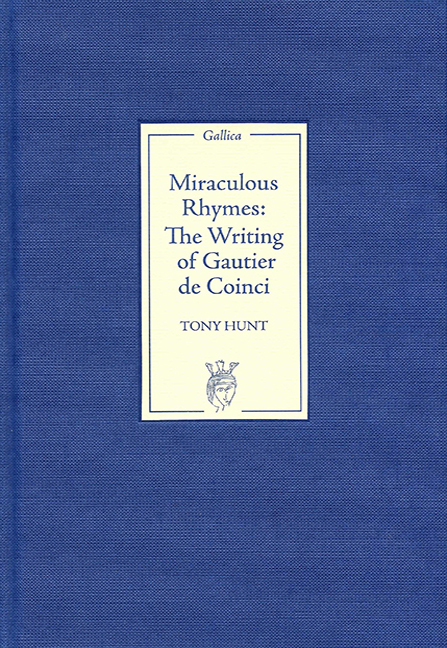1 - The Design of the ‘grant livre’
from Part I - The Writer and his Writing
Published online by Cambridge University Press: 29 April 2017
Summary
In any stylistic study of Gautier's writing, including his rhetorical wordplay and audacious rhyming, the architecture of his painstakingly constructed artistic and spiritual edifice can scarcely be relegated to the background. On the contrary, it is central to his enterprise and demonstrates clearly his minute (and continuing) attention to stylistic and textual matters, including his handling of discrete formal units which we shall be considering in this chapter. At the conclusion of his autobiographically enlivened account of Ildefonsus of Toledo Gautier presents himself as a writer exclusively concerned to honour Our Lady, whose favour is his unique inspiration and reward. The mere mention of writing characteristically generates rimes équivoques, homophonous word-rhymes, as he compares and contrasts his activities as a sort of jongleur de Notre Dame with those of the secular poets and entertainers:
Adés fuisse ses escrivainz,
Mais mout tost sui, quant escri, vains.
Por ce que redout ce meschief,
Li pri qu'un peu m'estraint mon chief
De ses tres blanches mains polies,
Si en dirai mains de folies.
...
Des troveeurs, quant je m'essai,
Ne mepris mie les essaies,
Mais por ce se vest noires saies
Et il vestent les robes vaires,
Ne leur desplaise mes affaires,
Car troveres ne sui je mie
Fors de ma dame et de m'amie
Ne menestrex ne sui je pas.
(1 Mir 11 2301–6, 2310–17)
[At once I would be her writer, but I rapidly become, when I am writing, light-headed. For fear of such a mishap, I pray to her to enclose my head in her smooth, white hands, that I may say fewer foolish things ... When I put my skills to the test, I do not scorn the devices of the trouvères, but I am dressed in rough black serge, whilst they sport fur-trimmed garments, may my role be not displeasing to them, for I am no trouvère save to my lady and friend, no common minstrel am I.]
Gautier insists that he does not compose for material gain: ‘Je ne truis pas por avoir pris / Ne por robes ne por avoir’ (2322–3), ‘Je ne truis pas por avoir robe’ (2327), ‘Je ne truis mie por avoir’ (2333). Unlike mere entertainers, he is guided only by piety and an aesthetic which is nourishd by that piety.
- Type
- Chapter
- Information
- Miraculous RhymesThe Writing of Gautier de Coinci, pp. 21 - 48Publisher: Boydell & BrewerPrint publication year: 2007



